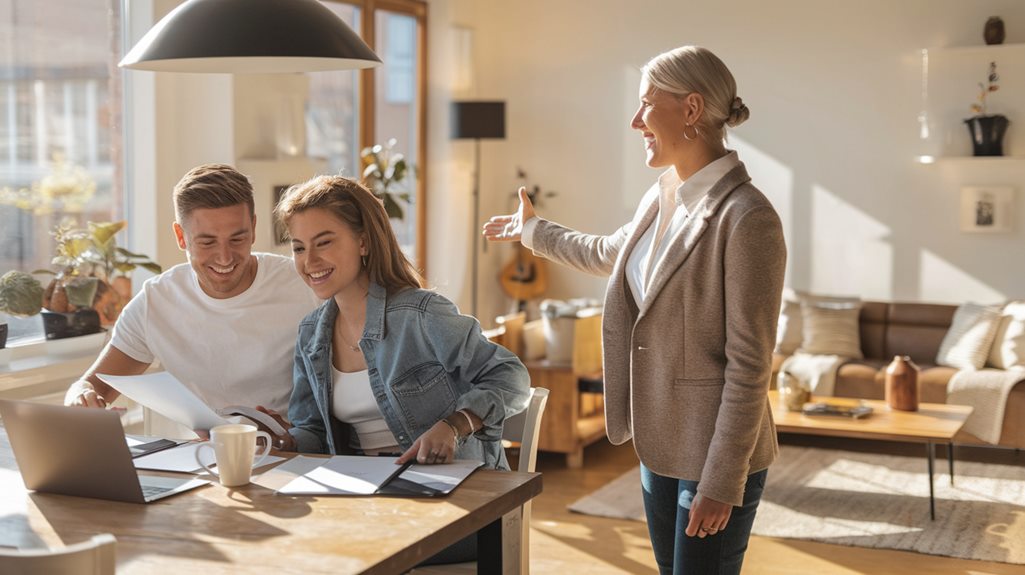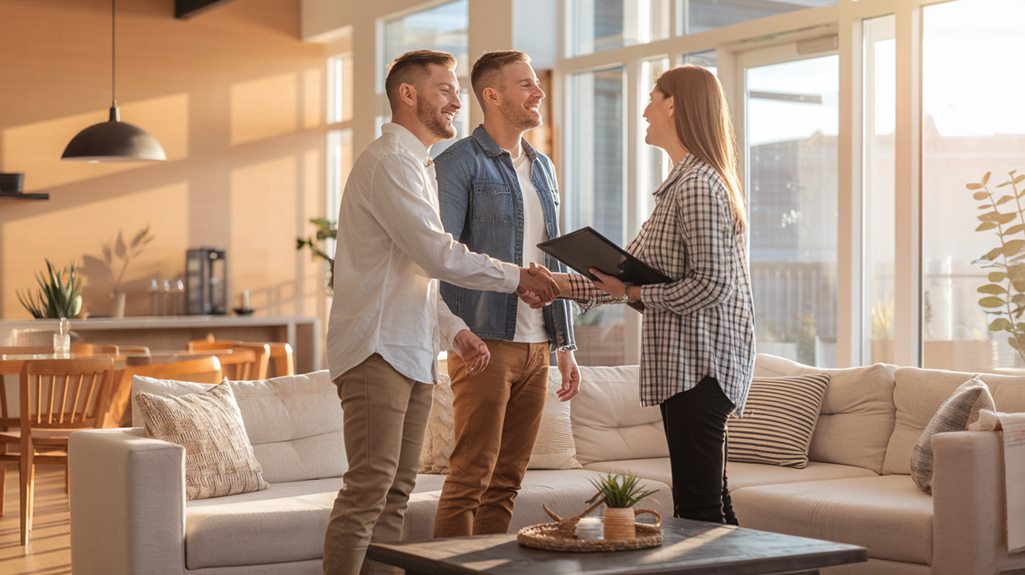If you are buying a home for the first time, it's important to start by checking if you are ready. Look at your money situation and know your credit score. Make a budget that shows how much you can spend. Getting a mortgage pre-approval can help you buy a home more easily.
Think about what you want in your new home. Write down the things that are most important to you. It's also good to learn about different neighborhoods to see which one fits your lifestyle.
Find a good real estate agent who can help you understand the market. Go to open houses to see different homes and picture what they could be like for you. Always get a home inspection to find out if there are any problems with the house.
When you find a home you like, be ready to negotiate the price. This helps you make sure you are paying a fair amount.
Don't forget about closing costs, which are extra fees that can surprise you at the end.
These tips can help you feel more confident as you start your home-buying journey!
Ready to start building equity in your own Michigan home? Get your personalized home loan quote today.
Assess Your Financial Readiness

Getting ready to buy a home is really important. Start by checking your credit score. This number tells lenders how likely you're to pay them back. A good score can help you get lower interest rates, which means you'll pay less money over time.
Next, look at your debt-to-income ratio. This is a way for lenders to see if you can pay your monthly bills. They want to know how much money you make and how much you owe.
Try to keep your debts low and earn more if you can. By taking care of these money matters, you'll be ready to get a mortgage and own a home.
When you know you're prepared, you can feel good about joining other smart buyers in the housing market.
Michigan residents, unlock the door to your new home. Request your home loan quote from Treeside Financial today.
Define Your Home Requirements
Start by thinking about what you really want in a home.
Make a list of things that are important to you, like where it is, how many bedrooms you need, or if it's close to places like buses or trains.
Knowing what you want helps you plan your budget and makes finding the right house easier.
A clear list makes sure you buy a home that fits your needs and is good for your wallet.
Identify Must-Have Features
When you start looking for your first home, it's important to think about what features you really want.
Ask yourself what matters most to you. Do you want a house that saves energy? Do you need a flexible layout?
Think about your future, too. Will your family grow? Is it important to be close to schools?
Look at the neighborhood and see if it has fun things to do. If you like gardening or having friends over for barbecues, having a nice yard might be a must for you.
Also, remember to think about how much time and money you'll spend on fixing things.
And don't forget about how easy it will be to sell the house later on.
Set Budget Limits
After you know what features you really want in your new home, it's time to talk about money. Setting a budget is super important. Here's how to do it:
- Look at Your Money: Check how much money you make, how much you have saved, and if you owe anything. This will help you know what you can afford.
- Find Out How Much You Can Pay Each Month: Think about how much you can spend each month for your house. This includes the mortgage, insurance, and taxes. Make sure it fits with your regular spending.
- Think About Extra Costs: Don't forget about other costs like closing fees, moving expenses, and any repairs you might need to do. Add these into your budget too!
- Get Pre-Approved: Talk to a bank or lender to find out how much money you can borrow. This will help you know what homes you can look at and make your buying journey smoother.
Buying a home is a big step, and planning your money wisely is the first step to feeling at home in your new community.
Secure a Mortgage Pre-Approval

Getting a mortgage pre-approval is really important. It helps you know how much money you can spend on a house.
When you have this pre-approval, you can look for homes that fit your budget. It also shows sellers that you're a serious buyer.
This can help you get a better deal when you make an offer. So, getting pre-approved makes your home buying journey easier and gives you an advantage!
Understand Your Budget
Before you start looking for a house, it's really important to know how much money you can spend. Getting a mortgage pre-approval is a great way to do this. It helps you see what you can afford and keeps you from running into money problems later.
Here are some simple steps to help you plan your budget:
- Look at Your Money: Check how much money you make, what you spend, and how much you save. This helps you see how you're doing with your money.
- Know Your Debt: Try to keep your debt low compared to how much you earn. Lenders will look at this to see if they can give you a loan.
- Save for a Down Payment: Put some money aside for a down payment. This is important because it can change the terms of your mortgage.
- Think About Extra Costs: Remember to plan for other costs like closing fees, property taxes, and fixing up your home.
These simple steps will help you make smart choices as you start your journey to owning a home.
Strengthen Offer Position
Getting a mortgage pre-approval is a smart way to make your offer better when you want to buy a home. It shows sellers that you are serious and ready to buy. When you have pre-approval, it helps you stand out from other buyers who haven't done this important step. It also helps you know how much money you can spend, so you can look for homes that fit your budget.
| How to Make Your Offer Stronger | Ways to Be Competitive |
|---|---|
| Shows you can pay | Helps you stand out |
| Helps you know your budget | Shows you are serious |
| Makes it easier to talk to sellers | Increases the chance of acceptance |
| Tells you how much to spend | Makes sellers feel good |
| Reduces stress while buying | Speeds up the buying process |
Use these tips to feel like you belong in your dream neighborhood and make your offer shine!
Research Neighborhoods Thoroughly
Buying a home is an exciting journey! To make the best choice, it's important to learn about the neighborhoods you're considering.
First, look at what each area has, like parks, shops, and ways to get around. Check out how safe the neighborhood is by looking at crime rates and the quality of schools. This way, you can be sure your family will be safe and get a good education.
It's also smart to think about any new buildings or parks that may come soon. These can change how much your home is worth. To really feel the heart of the neighborhood, go to local events and meet the people who live there. This will help you see if it's a place where you can belong.
Here's a simple checklist to help you with your research:
- Local Amenities & Public Transport: Find parks, shops, and bus stops nearby.
- Crime Rates & School Quality: Look for low crime and good schools.
- Future Developments: Find out if there are any new buildings planned.
- Community Vibe & Local Events: Attend local events to see how friendly the area feels.
Hire a Reliable Real Estate Agent

Choosing the right real estate agent is very important when you're buying a home. A good agent knows a lot about the market and can help you through the tricky parts of the process.
Start by looking at what the agent has done before. You want someone with experience and who knows your area well. This way, they can help you avoid problems and find great opportunities.
It's also really important that your agent talks to you well. You need someone who listens to what you want, answers your questions quickly, and explains things clearly.
This builds trust and helps you feel supported. When you find an agent who fits these qualities, you're not just getting a helper; you're getting a friend in your journey to find your new home.
Attend Open Houses Strategically
Why should you go to open houses with a plan? Having a plan helps you use your time wisely and meet new people.
Here's how to enjoy your open house visits:
- Look Up Info: Before you go, find out about the house. This helps you ask smart questions and shows you care.
- Dress Nicely: Wear good clothes. This helps you connect with the sellers and agents. It makes meeting new people easier.
- Write Things Down: Bring a notebook or use your phone. Write down what you like and don't like. This helps you remember houses later.
- Talk to Others: Chat with agents and other visitors. Sharing what you think can help you learn more and make friends.
Going to open houses with a plan helps you make better choices!
Conduct a Home Inspection

When you check a house, you help keep your money safe by finding problems that you mightn't see right away.
A good inspection can help you talk about fixing things and can save you money and trouble later on.
Always ask a trained inspector to help you make a smart choice when buying a home.
Identify Potential Issues
When you want to buy a home, it's super important to check it out really well first. This helps you make a smart choice and feel good about where you'll live.
Here are some things to look for that might show there could be big problems later:
- Strong Building: Look at the ground, roof, and walls. If they're weak, fixing them can cost a lot of money.
- Health Risks: Check for things like mold, asbestos, or radon. These can be bad for your health and can lower the value of the home.
- Safe Neighborhood and Rules: Make sure the area is safe and that the rules match how you want to live now and in the future.
- Condition of Appliances and Care History: Make sure all the appliances work well and look at how the home has been taken care of. This can help you know how much money you might need for fixing things up later and how much you can sell it for in the future.
Negotiate Repair Costs
When you look at a house you want to buy, it's important to check for problems. If you find issues, you need to talk about how much it will cost to fix them.
First, get some repair estimates from good workers you can trust. This helps you know what the repairs should really cost.
Next, when you talk to the seller, focus on the big repairs that could make the house unsafe or less valuable. Use this information to ask for a lower price or for the seller to pay for some of the repairs. Being ready with facts makes your case stronger.
When you negotiate well, you can buy the house without spending too much money and make sure it's safe to live in. This teamwork can help you feel like you belong in your new neighborhood.
Understand the Offer Process
Buying a home can be exciting but tricky! To make sure you get the house you want, it's important to know how to make a good offer. Here are some simple steps to help you:
- Look at the Market: Check what homes are selling for in your area. This helps you know if your offer is fair.
- Get Pre-Approved: This means a bank says you can borrow money. It shows sellers you're serious and ready to buy.
- Set a Budget: Decide the most money you can spend. This way, you won't spend too much and get into trouble.
- Act Fast: Homes can go quickly! Be ready to make your offer right away so you don't miss your chance.
Following these steps can help you on your way to owning your new home!
Negotiate Effectively

Buying a home can be exciting! To make sure you get a good deal, think about how to make your offers. Look at other homes like the one you want to help you decide on a fair price. If the price doesn't feel right, it's okay to walk away. This shows that you know what you want.
Talking to the seller's agent is very important. Be friendly and respectful. This can help you get a better deal. Make sure to listen carefully and share your thoughts clearly.
It's important that both sides feel understood. Remember, you want to find a good agreement that helps you get your dream home and feel welcome in your new neighborhood.
Prepare for Closing Costs
Closing costs can catch you off guard if you're not ready. If you're buying your first home, it's important to know what these costs are. They're the fees you pay when you complete your mortgage, and sometimes there are extra charges you didn't expect.
To be a smart homeowner, try these steps:
- Learn: Find out what closing costs are common in your area. This way, you can guess what you might pay.
- Save Money: Put aside 2-5% of the price of your home. This helps you avoid money worries at the last minute.
- Ask Questions: Don't be shy! Ask your lender for a clear list of all the costs. Knowing helps you avoid surprises.
- Talk About Fees: Some fees can be changed. Ask about this to see if you can lower your costs.







